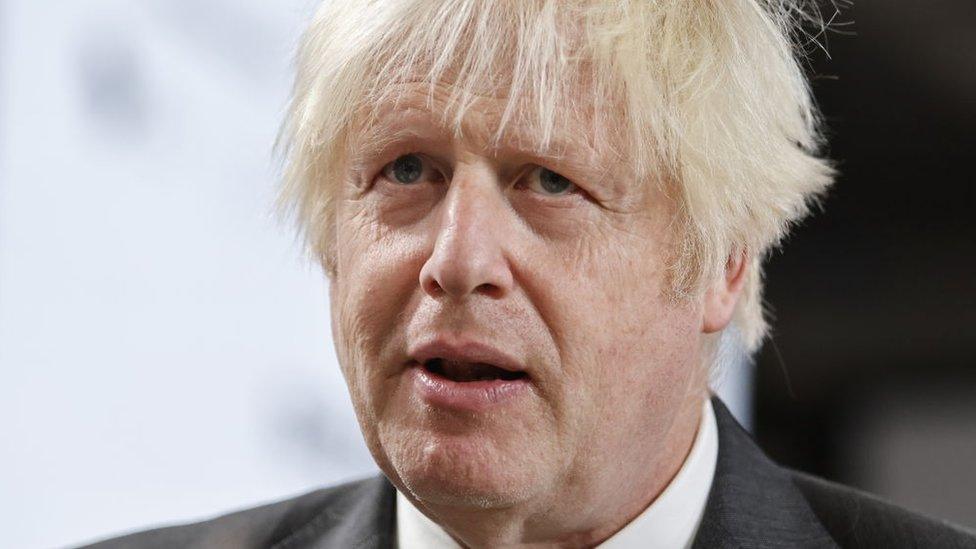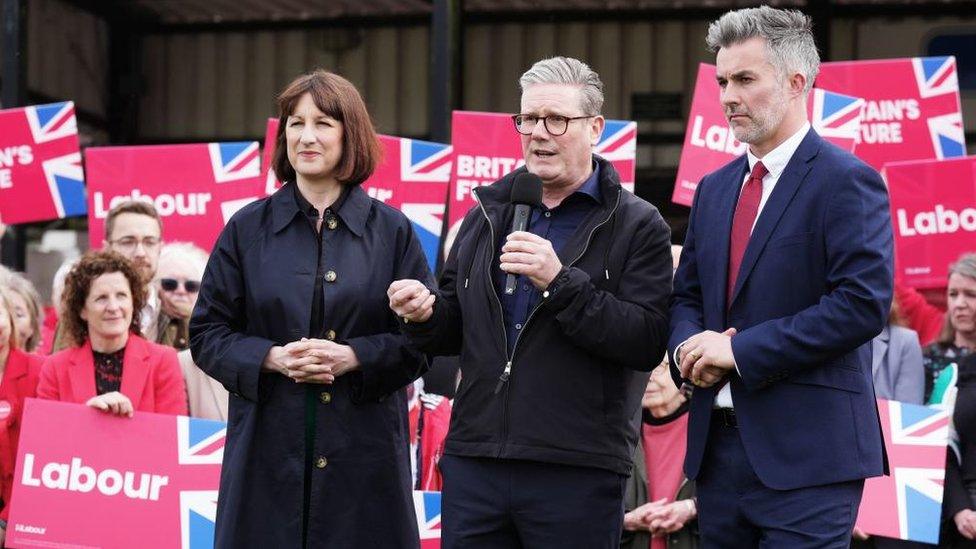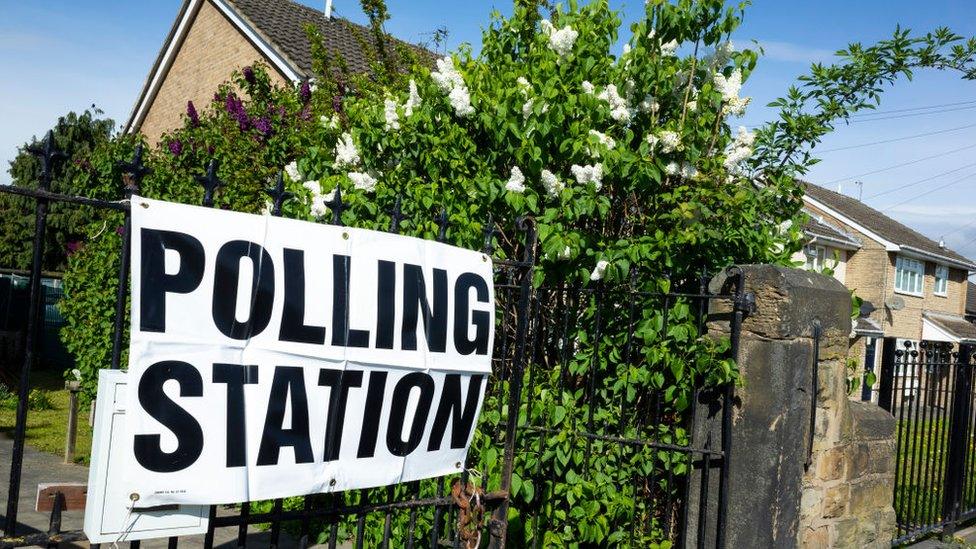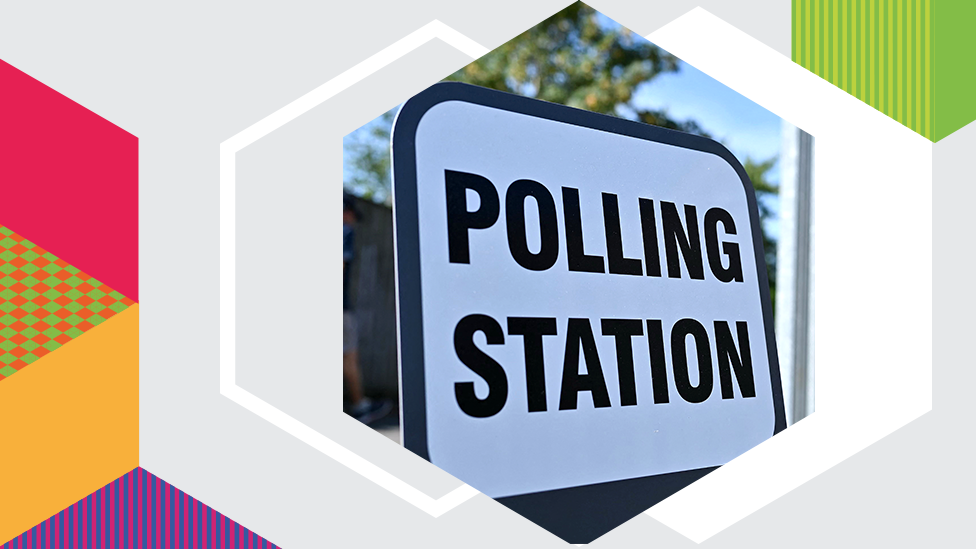Boris Johnson turned away from polling station after forgetting ID
- Published

Former Conservative Prime Minister Boris Johnson was turned away from his local polling station after forgetting to bring acceptable photo ID.
As first reported by Sky News, he returned later with the necessary ID and was able to vote.
He cast his ballot in South Oxfordshire, where voters are choosing a police and crime commissioner.
New rules requiring photo ID to vote were introduced by Mr Johnson's government in the Elections Act 2022.
The change was rolled out last year, with local elections in May 2023 the first time voters needed to show ID.
According to the Electoral Commission, about 14,000 people were unable to vote in last year's local elections in England as a result of the new rules.
There are 22 acceptable forms of ID, external, including passports, driving licences, older or Disabled Person's bus passes and Oyster 60+ cards.
People who are registered to vote can also apply for a free document known as a Voter Authority Certificate, external.


The government has also said it intends to make veterans' ID cards a valid form of voter identification after some former service personnel were turned away from polling stations.
Army veteran Adam Diver, 48, said he felt "gutted" when he was turned away from a polling station in Fleetwood, Lancashire, after presenting his veterans' ID card.
Mr Diver, who served in the Army for 27 years, said he felt as if his service was "invalidated" when his card was rejected.
"I thought you could use it as an ID card. It's like a driving licence, you can't get any more official," he said.
Veterans minister Johnny Mercer apologised to Mr Diver on social media.
"The legislation on acceptable forms of ID came out before the veterans ID cards started coming out in January this year," he wrote.
"I will do all I can to change it before the next one."
A No 10 spokeswoman said: "It is our intention for the new Veteran Card, which was rolled out in January, to be added to the official list."
Veteran Cards have been issued to people leaving the army since 2018. They were rolled out more widely to all veterans in January this year.
The government is consulting on adding the card to the list of acceptable voter ID, which already includes armed forces identity cards.
Meanwhile, Conservative MP Tom Hunt said his dyspraxia caused him to lose his passport and he had to arrange an emergency proxy vote.
Mr Hunt, who represents Ipswich, said he does not want to "blame everything on my dyspraxia", but it is "well known that sadly we are slightly more prone to lose things".
He warned people "persecuting" him online to be "very careful with their words".
People can apply for an emergency proxy vote until 5pm on polling day if their ID has been lost, stolen or damaged.
Asked about problems reported over voter ID, Transport Secretary Mark Harper said there were "bound to be, when you have millions of people voting, a small number of issues".
However, he said he thought "most voters have actually found it perfectly straightforward to vote with the necessary ID across the country".
Asked about Mr Johnson being turned away, Northern Ireland Secretary Chris Heaton-Harris, who served as his chief whip, told BBC Radio: "As someone who knows Boris well, I can't say it completely surprises me... I do know that he then simply went home, got some ID, went back to the polling station and voted Conservative."
The Electoral Commission said "most voters who wanted to vote were able to do so", despite voter ID requirements.
"We will now begin to collect evidence from voters, electoral administrators, partner organisations, and campaigners to understand their experiences of the elections and identify any potential obstacles to participation," a spokesman said.
Electoral Commission chief executive Vijay Rangarajan told BBC Radio 4's Today programme that large-scale campaigns to raise awareness of the rules appear to have been successful.
Asked about issues some voters faced, he said: "It looks as if these are teething problems at the moment but we're going to evaluate this really carefully."
Related topics
- Published2 May 2024

- Published29 April

- Published2 May 2024
